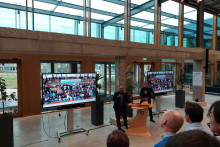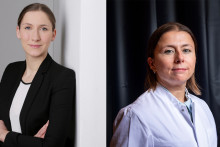What is your advice to the University Committee for Education, what does PIA emphasize?
Schut: 'The figures are worrisome and too many of these students appeal to special circumstances. All members of the platform agree on this. But at the same time we do not know much. Are we doing worse than other universities? Do students from one study program have more difficulties than others? Do students from a certain country or region face these problems?’
‘Very worrying figures’
The Committee Personal Circumstances (CPO) recently reported on a group of young international students, whose study suffer from mental problems. 'Very worrying figures', the CPO wrote in its annual report. The problem will be discussed in the University Committee for Education meeting in mid-March.
'In any case, it is clear that the UT must deal with this problem. It concerns young people of eighteen, sometimes seventeen years old. We think that they lack a social network on campus. Too many students become isolated, as the CPO noted. In order to improve this, ITC can serve as an example. They really take students by hand and guide them. Not only when they arrive in Enschede, but even before they travel to the Netherlands.’
'The second element is the information that we give these prospective students. Do we make it sufficiently clear what it means to live and study in the Netherlands? All that information is on our website, but do the students take note of it? Maybe we should rework the information for this group.’
The CPO made the same recommendations. Prepare these students and guide them individually, was the advice to the Executive Board.
'We also think that guidance and information are the most important solutions. You see, the international influx in the bachelors is relatively new. We have experience with the masters, but those students are a few years older and they already have a bachelor's degree, which gives some guarantee that they can succeed. In that respect, we are now dealing with childhood diseases. '
The conclusions of the CPO report are not new, the same recommendations were made a year earlier. Does this problem receive enough attention?
'There is no discussion about the necessity, the figures are very worrying. The UT has all the needed expertise and support to accommodate these students. But it seems to be too fragmentated, we notice in the platform. We think that the internationals miss a physical counter where they can go with their questions.'
'The Student Union, which is part of the PIA, also feels that urgency. At the moment, they investigate how the Kick-In can be made more attractive. International students seem to think it is mainly about partying. But the curricular part of the Kick-In is important for a new student, because you get acquainted with your study program. If you miss that, you immediately fall behind. Also, it would be good if Dutch and international students mix immediately. This prevents social isolation. '
The UT is fully committed to recruiting this target group, as more new students is one of the targets for the new provider of the international pathway year. Shouldn’t this be on hold for the time being?
‘No, that did not come up in the meeting. The internationalization of the campus is not under discussion. Of course, you may wonder whether we have gone too fast and whether we have underestimated the consequences. There will always be a tension between the training and the study programs. On the one hand, the UT wants to attract as many students as possible, but in the study program you want the right people in the lecture rooms. Creative Technology, for example, uses matching to these means.'
The PIA consists of UT staff from faculties and services in charge of internationalization. Doesn’t that make it difficult to say: maybe we should not recruit bachelors from outside of Europe?
‘No, I do not believe that. All members of the platform are professionals who work on internationalization from their own fields of expertise. They focus not only on attracting more students to the campus, but also on how we deal with them. And yes, the members can also be critical when needed. For now this involves a relatively small group of one hundred students. We have to get the guidance for this group in order.'







